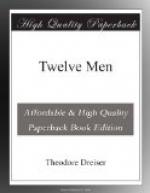Culhane, leaving his place at the head of the column, returned to the center nearest the plumber and his helper and pointing at them and addressing us in a very clear voice, said:
“There you have it. There’s American labor for you, at its best—union labor, the poor, downtrodden workingman. Look at him.” We all looked. “This poor hard-working plumber here,” and at that the latter stirred and sat up, scarcely even now grasping what it was all about, so suddenly had we descended upon him, “earns or demands sixty cents an hour, and this poor sweating little helper here has to have forty. They’re working now. They’re waiting for that little bit of lead to boil, at a dollar an hour between them. They can’t do a thing, either of ’em, until it does, and lead has to be well done, you know, before it can be used.
“Well, now, these two here,” he continued, suddenly shifting his tone from one of light sarcasm to a kind of savage contempt, “imagine they are getting along, making life a lot better for themselves, when they lie about this way and swindle another man out of his honest due in connection with the work he is paying for. He can’t help himself. He can’t know everything. If he did he’d probably find what’s wrong in there and fix it himself in three minutes. But if he did that and the union heard of it they’d boycott him. They’d come around and blackmail him, blow up his barn, or make him pay for the work he did himself. I know ’em. I have to deal with ’em. They fix my pipes in the same way that these two are fixing his—lying on the grass at a dollar an hour. And they want five dollars a pound for every bit of lead they use. If they forget anything and have to go back to town for it, you pay for it, at a dollar an hour. They get on the job at nine and quit at four, in the country. If you say anything, they quit altogether—they’re union laborers—and they won’t let any one else do it, either. Once they’re on the job they have to rest every few minutes, like these two. Something has to boil, or they have to wait for something. Isn’t it wonderful! Isn’t it beautiful! And all of us of course are made free and equal! They’re just as good as we are! If you work and make money and have any plumbing to do you have to support ’em—Right by fours! Guide right! Forward!” and off we trotted, breaking into a headlong gallop a little farther on as if he wished to outrun the mood which was holding him at the moment.
The plumber and his assistant, fully awake now to the import of what had occurred, stared after us. The journeyman plumber, who was short and fat, sat and blinked. At last he recovered his wits sufficiently to cry, “Aw, go to hell, you —— —— ——!” but by that time we were well along the road and I am not sure that Culhane even heard.




